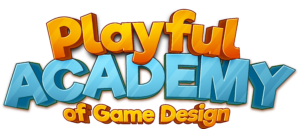

Categories
Games Have 5 Elements
Learning Objectives
- Lesson objectives
- Feel welcomed to camp
- Understand the camp experience
- Identify as a game designer
- Establish camp rules
- Understand levels and achievements
- Define a game
- Define the 5 elements of games
- Engineering design objectives
- Define the criteria and constraints of the escape game design problem
- Socioemotional learning objectives
- Welcoming
- Planful
- Cooperative
- Responsible
- Creative
Materials
- Camp and achievement posters
- Emergency numbers poster
- Sticky notes
- Optional: brief game to play
- Camper notebook
- What is a Game? warm-up
- Game analysis worksheet
- Game analysis example
Note: For every lesson you will need pens, pencils, or markers
Instructions
- Warm-up
- Have campers complete the What is a Game? warm-up.
- Welcome and introductions
- Gather campers together and welcome them to camp.
- Ask everyone to introduce themselves by saying, My name is ___ and I am a game designer.
- Describe the goals for the week: to learn about how games are created and to design their own escape game.
- Go over the camp logistics, like schedule, bathroom locations, and emergency procedures. Be sure to show campers the emergency numbers poster.
- Camp rules
- Tell campers the base rules:
- No kids in the office
- No playing with doors - don't hold doors open or shut and don't try to open closed doors
- Don't damage the escape rooms or the props
- Either participate or sit quietly during lessons
- No devices during lessons
- You may bring a device but you must bring your own charger
- Tell campers that we will create the rules for the day/week together and ask them what rules would help everyone have a good time.
- Ask campers to contribute to the rules.
- Add each rule to the camp poster. Some rules should be discussed/clarified if they are ambiguous or too harsh.
- Discuss a consequence for breaking the rules and add that to the poster. The consequence should be meaningful and enforceable.
- Tell campers that we can revisit the rules whenever we like.
- Tell campers the base rules:
- Achievements and level pendants
- Tell them that the 5 main lessons help them create an escape game and will give them the level pendants.
- Explain that the other lessons and side quests will help them understand game design better and that they can earn achievements for completing them. The achievements handout and achievements poster show all the achievements they can earn. We will track achievements on the leaderboard.
- Tell campers that since the focus of this camp is on fun and exploration, they are not required to do any lesson. But they have to sit quietly at the table during lessons, with no devices, and they will get achievements for doing lessons.
- Game design as STEM
- Tell campers that game design can be considered part of STEM: science, technology, engineering, and math. Game designers use technology to build games. For example, computer scientists use game engines and write code for video games, and artists use graphic design tools to build worlds and characters.
- In computer games, game designers use mathematical concepts used in game mechanics, such as physics simulations, collision detection, and algorithms for character movement.
- This week, you'll use engineering principles to plan, design, and test your games
- Define a game
- Draw attention to the warm-up and ask campers to talk about which activities they classified as games and why
- Give our definition of a game: a problem-solving activity that one or more players engage in for fun.
- Ask campers to think about what they think “problem-solving” and “for fun” mean. We’ll discuss these ideas more later.
- By a problem-solving activity, we mean an attempt to reach a goal when there is no obvious solution.
- We have to use problem-solving in our everyday lives, but it isn't necessarily fun. Games are done mainly because they are fun or entertaining in some way.
- 5 elements
- If they did the warm-up, ask campers to show the houses they drew and to talk about their favorite games.
- Show campers the five elements of games on the camp poster and ask for definitions and examples of each
- Premise: the overall point of a game; it’s objective
- Story: guiding narrative for the game
- Characters: the actors within the game who play out the story
- Mechanics: the rules (what you can and cannot do) and procedures (how you get to the objective)
- Resources: things you use in the game to get to the objective
- Example game (optional)
- Play a very brief example game with simple rules, such as Hot Potato or Uno.
- Have campers work in pairs to complete the project worksheet, where they will analyze the elements of a game. You may need to walk them through the game analysis example, which analyses Hot Potato. They will not actually get a sticker for the first level pendant, since there is a picture of it on the leaderboard.
Notes and Discussion
Discussion
- Throughout camp, provide gentle reminders of the rules. Always enforce the consequence after a warning.
Notes
- Since this is the first lesson, it will take longer than most lessons. Be sure to establish the guidelines for participation early. All campers are encouraged to be active listeners in the lesson, but if they don’t want to participate, they should sit quietly or go to another part of the room. Throughout camp, refer to the differences in the five elements across games.
